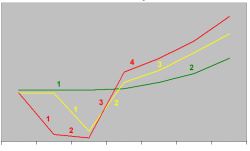Carbohydrate Loading
Con in the "carbo-loading argument"
 Carbohydrate loading or Glycogen loading is a concept derived from research published in Sweden by Drs. Saltin and Hermanson in 1967. Their work lead to a deluge of muscle glycogen and endurance performance studies throughout the world.
Carbohydrate loading or Glycogen loading is a concept derived from research published in Sweden by Drs. Saltin and Hermanson in 1967. Their work lead to a deluge of muscle glycogen and endurance performance studies throughout the world.
Using muscle biopsy techniques they studied athletes under a variety of dietary and athletic endurance protocols. It was shown that significant increases in muscle glycogen (the muscle storage form of glucose) could be achieved by increasing the carbohydrate intake over several hours to days before endurance performances.
In fact, these developed glycogen levels were optimum when the high carbohydrate diet was preceded by prolonged (over one hour) exhaustive exercise thus depleting the muscle glycogen stores.
This evidence and several other similar studies lead to the indiscriminate practice of "carbo-loading" prior to all kind of competitions. It also lead to a plethora of supplement products designed to "optimize" these glycogen stores.
The fallacy of such practices are based on:
- The assumption that muscle glycogen levels are the limiting factor to performance. This is not true unless the event is continuous at high intensity for over 1 hour. Most long triathlons and marathons (the two events where there may be some logic to some carbohydrate manipulation) are run at 65 - 75 per cent of aerobic capacity and even then, we still obtain 50 per cent or more of our energy from fat in these events.
- There is also an assumption that the higher the muscle glycogen the more strength one exhibits and the faster they can run. Neither is true. There is no evidence that a muscle "half or one quarter full" of glycogen is stronger or faster. In fact Saltin reported, in conjunction with his original work, that speed differences over a one hour period were unaffected by glycogen levels.
Other issues of concern are:
- Every gram of glycogen stored obligates 3 grams of water. If an athlete glycogen loads to a maximum level they can be carrying an additional 4 to 6 pounds of water at the beginning of performance.
- Elevated carbohydrate intake increases the insulin production which increases fat storage, interferes with fat mobilization for energy, disturbs other hormonal balances, and increases blood pressure, blood cholesterol and triglyceride levels.
- "Carbo loading" can aggravate hypoglycemic responses during team sports and this can impair judgment, concentration and other performance measures.
As far back as 1939 it was shown by Christensen and Hansen of Sweden that a high carbohydrate meals immediately prior to a "strenuous" athletic competition impaired performance.
There is evidence that if blood glucose levels can be maintained, muscle glycogen can be spared and therefore lead to longer, high intensity performances during endurance events exceeding one hour.
My advice is to maintain good muscle glycogen levels with 40 percent of calories coming from complex carbohydrates; observe good recovery practices (see article on what to eat for optimum performance) and during long endurance performances consume a high quality sport drink to maintain the blood glucose levels.